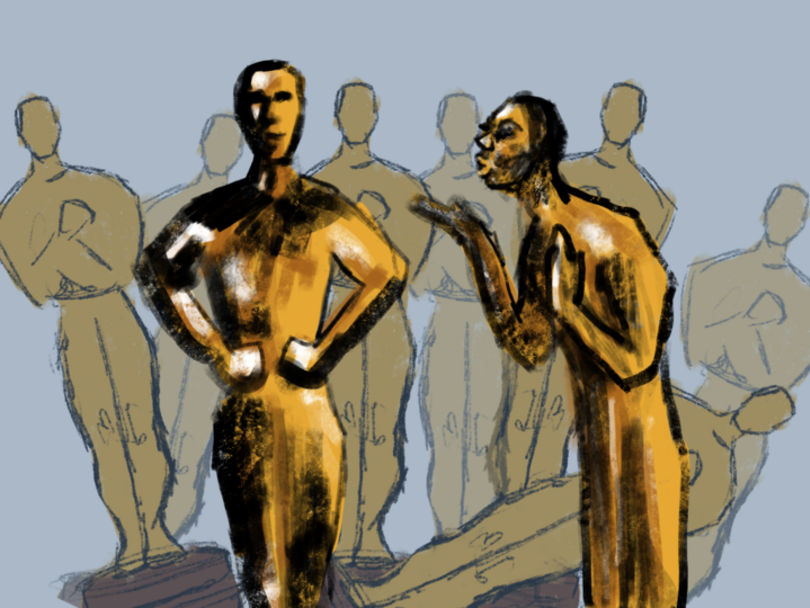Opinion: Recent media sacrifices meaningful plots for sexualized appeal

Our columnist asserts the substance of recent media is put aside as sexual appeal dominates music, books and film. Our writer urges we fight the push against intellectualism that’s fueling the shift from meaning to shock value. Emma Lee | Contributing Illustrator
Get the latest Syracuse news delivered right to your inbox.
Subscribe to our newsletter here.
On Sept. 3, the trailer for Emerald Fennell’s “Wuthering Heights” film dropped, leaving viewers with strongly mixed feelings. As Emily Brontë’s original novel followed themes of racism, classism and abuse, many were surprised to see the overtly sexual route Fennell has taken.
All of the blame for this problematic rendition, however, can’t go solely to Fennell herself. We’re in a time where meaningful, effective plot is casually sacrificed for the shock value of sex. From “Nosferatu” to modern contemporary books to the music world, the actual substance of art seems to be left behind in the 2020s.
What makes a classic unforgettable is its ability to transcend its own time period. “Wuthering Heights,” for example, has upheld the scrutinizing analysis of readers for almost 200 years because of its hard-hitting narrative.
While I won’t discredit the strong tension between our main characters, Heathcliff and Cathy, it should be noted that their tragedy is meant to be rooted in Heathcliff being a brown man in love with an upper-class white woman. The original story has nothing to do with his conjured “sexual depravity.” Heathcliff himself even said, “I wish I had light hair and fair skin, and was dressed, and behaved as well and had a chance of being as rich as he will be!”
Fennell discarded this imperative element of the book to cast Jacob Elordi as Heathcliff, a white man. It seems she’s more concerned with writing an Elordi and Margot Robbie fanfiction than she is with plot accuracy.
In this modern era of sexual liberty, pop culture has become obsessed with lust. Both music and TV demonstrate a clear emphasis on sex and the power it brings. When we think of eminent stars like Sabrina Carpenter and Megan Thee Stallion, it’s not misplaced to say that a primary part of their music revolves around sexual desire.
There’s no inherent issue with this, especially as women are beginning to have more autonomy when it comes to sexuality in general. In fact, it’s vital to have voices empowering their sexuality. It becomes an issue, however, when important narratives are tossed aside for mere sexual appeal.
During a time of extreme political upheaval, reactions to Carpenter’s new album cover for “Man’s Best Friend” are not ridiculous. With Carpenter herself kneeling on the cover, being tugged by her hair, the image gives a sense of submission to an already oppressive time for women. These upsets can’t be settled by a simple, “Y’all need to get out more” from the popstar.
If anything, people’s outrage is rooted in uncomfortable and even traumatizing experiences. Normalized catcalling, assault and rights being taken away have left women forced to fight a daily battle for crumbs of respect.
Film, music and books all have places for fun and pleasure, but when sex becomes the poster child for everything, we risk losing narratives crucial to the power the media truly holds.Dayna Roberts, Columnist
Carpenter’s playful discography and privilege as a white, conventional woman cause her “subversive” album to fall flat, and instead feel like a slap in the face to some fans. Most listeners are not “clutching their pearls” because it’s provocative – that’s why many enjoy her music. Really, they’re rejecting the album because it’s a poorly executed statement that holds little meaning.
The sexual side of music doesn’t always fail, though. When it comes to artists like Megan Thee Stallion, there’s a clear empowering nature to her music.
Rather than situating herself as someone settling for the bare minimum, Megan’s music is all about female dominance. As a Black, LGBTQ+ woman speaking on sexuality and power, her music has an edge. It empowers women of color who are constantly grappling for control in a world trying to push them aside.
Not everything has to be serious, but some things should be. There’s a push against intellectualism in our generation that has caused us to overlook the importance of meaning in the media we consume.
It doesn’t matter if you think something “isn’t that deep.” Whatever we’re listening to or watching has been encoded with a message we internalize, whether we realize it or not. This is especially important when considering books.
With a new wave of reading, literacy should be on the rise. Against all odds, though, the content of newer books seems to be decreasing the intelligence of readers rapidly. Contemporary romance books are focused on marketability, sex or, more accurately, “smut,” over thought-provoking content.
This replaces the art of literary analysis and value. Many “booktokers” have even been complaining about some novels having too many words or arguing that not all books need to have depth.
With book censorship and banning going strong, the emphasis on lust and not much else in novels is concerning.
We live in a time where our own government wants us to know and learn less. There’s a power in expanding what you consume in literature that shouldn’t stop at attractive love interests in romance novels and films.
Film, music and books all have places for fun and pleasure, but when sex becomes the poster child for everything, we risk losing narratives crucial to the power the media truly holds. Not every movie needs a nude scene and not every book has to be “dark romance.”
If we continue prioritizing lust for the shock value that sex seems to give us, we lose the actual value of the very story we’re trying to depict.
Dayna Roberts is a junior majoring in creative writing. She can be reached at dbrobert@syr.edu.





